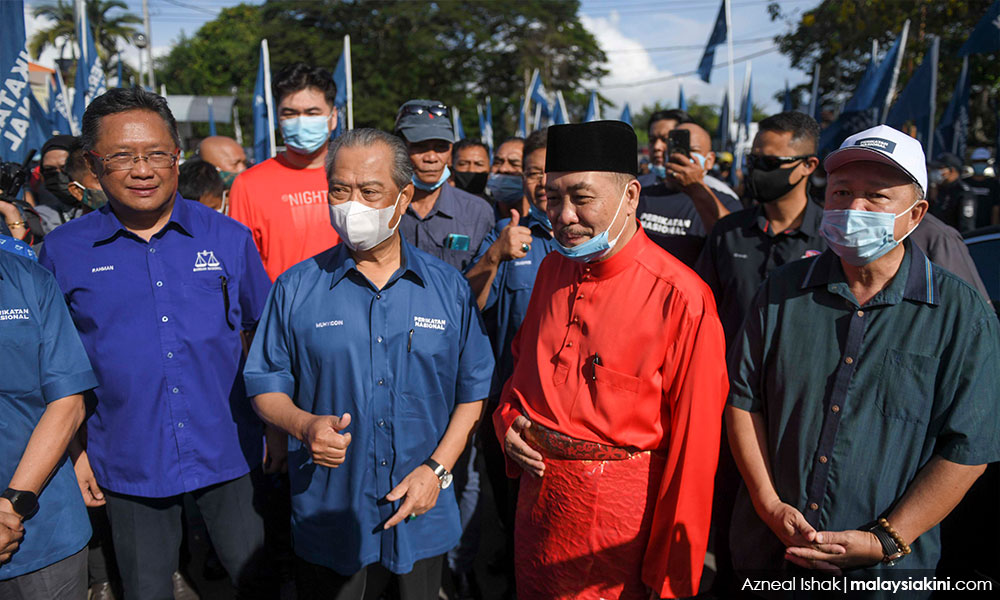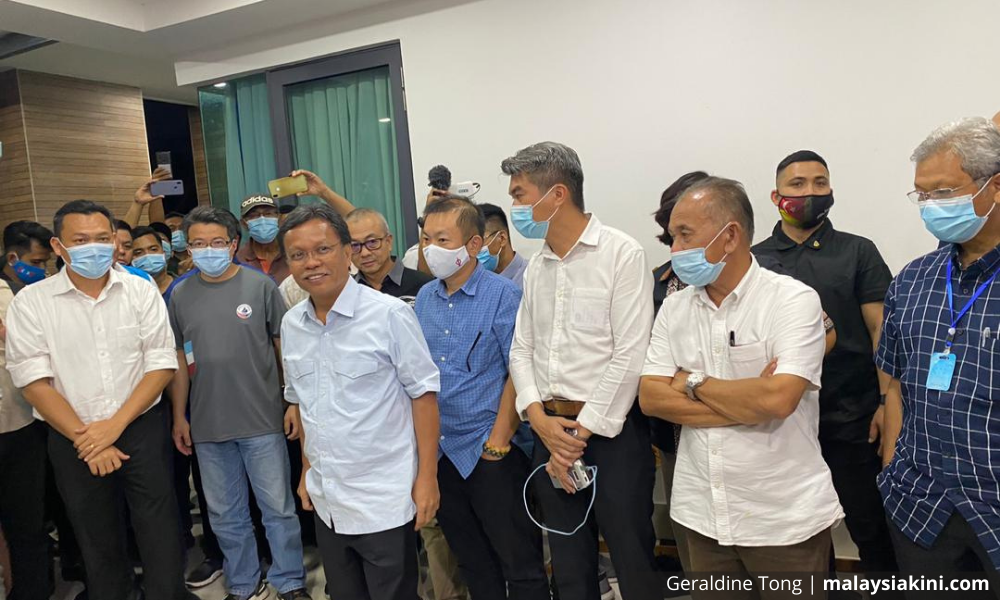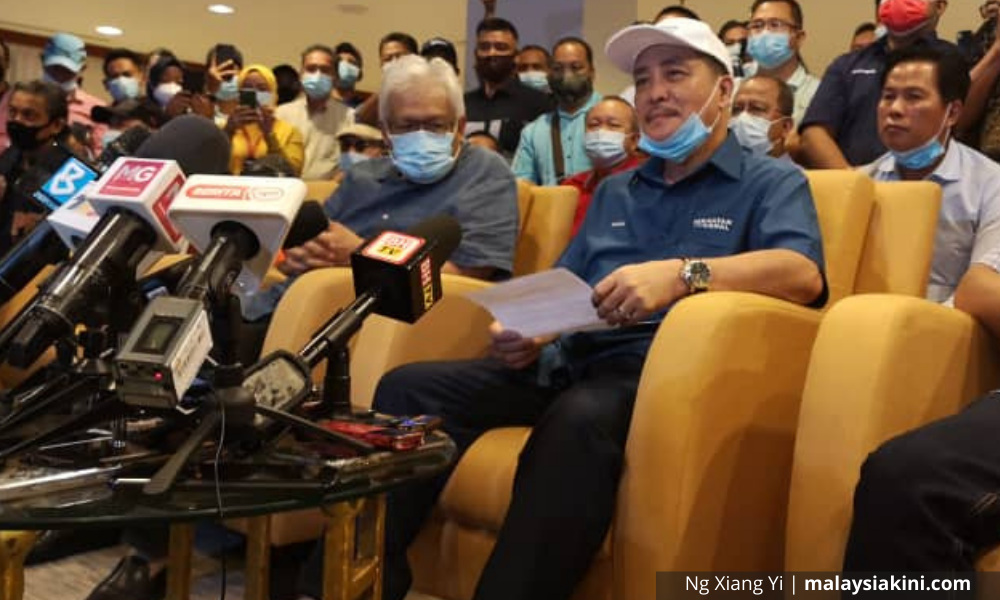The Sabah election may have concluded but the race to form the state government has only just begun.
Gabungan Rakyat Sabah (GRS) - comprising Perikatan Nasional (PN), BN, and PBS - won a simple majority in the election last night after securing 38 out of the 73 contested constituencies, which is a two-seat majority.
Conventionally, the chief ministerial candidate would quickly be sworn in and then convene a special state legislative assembly sitting to appoint up to six nominated state assemblypersons, who can bolster the new government's majority.
A system unique to Sabah, the nominated representatives enjoy the same rights as an elected state assemblyperson. Their vote also counts in keeping or changing the chief minister.
This was what former chief minister Musa Aman tried to do after the May 9, 2018 general election.
At the time, Musa's BN was in a stalemate with the Warisan Plus alliance as both coalitions won 29 seats respectively. A total of 60 seats were contested in that election.
The other two seats were won by Star, which Musa quickly cut a deal with for their support. He was then sworn in as chief minister on May 10, a day after the election.
However, before Musa could convene a special state assembly sitting to appoint nominated assemblypersons who will be friendly to his government, Warisan president Shafie Apdal engineered a series of defections that cost Musa his majority.
Shafie was then sworn in as the chief minister on May 12, two days after Musa was sworn in.
Four days after that, Shafie appointed two nominated assemblypersons and another two in the following month.
Fast forward to today, GRS, which has a slim majority, would also want to move with haste as Shafie could pull off another series of defections as he did in 2018.
Complicated coalition of coalitions
However, unlike in 2018 where Musa was the undisputed chief ministerial candidate for BN, the GRS is a more complicated coalition of coalitions.
Of the 38 seats GRS won, PN has 17 seats, BN took 14 seats, while PBS secured seven.
PN, which won the most seats within GRS, sees itself as the natural coalition to have a say on who should become chief minister.
Prime Minister Muhyiddin Yassin previously proposed the newly minted Sulaman assemblyperson Mohd Hajiji Noor (below, second from right) as PN's chief ministerial candidate.
However, PN's 17 seats are contributed by two parties, namely Bersatu with 11 and Star with six.

In contrast, Umno is arguing that even though BN won fewer seats than PN as a coalition, but Umno as a party won the most seats in GRS.
All of BN's 14 seats were contributed by Umno. Its BN allies PBRS and MCA failed to win anything.
As individual parties, Bersatu comes in second with 11 seats while PBS is third with seven seats and Star is fourth with six seats.
"The chief minister from GRS must be chosen from Umno," Umno president Ahmad Zahid Hamidi told Malaysiakini.
However, the legal procedure has little regard for the intricacies of coalition politics.
Instead, all that matters is who has the support of at least 37 out of the 73 newly elected assemblypersons – the bare minimum for a simple majority.
This means no single party in GRS can get their own candidate sworn in as chief minister behind their allies' backs as every single party is needed to meet that threshold.
That is unless one of them cuts a deal with the current opposition.
Delay allows time to cut deals
For the Warisan Plus alliance, its undisputed chief ministerial candidate is Shafie Apdal.
However, the coalition comprising Warisan, Pakatan Harapan (DAP, PKR, Amanah) and Upko only won a total of 32 seats, which is five seats shy of a simple majority.
Warisan won 23 seats, DAP took six, PKR secured two, while Upko received one.
If any party on the winning side defects to the Warisan Plus alliance, it could cause the GRS to fall as a government even before it is properly formed.
Shafie (below), speaking to reporters after the election, indicated that he was not going away without a fight.

With 23 seats, Shafie argued that Warisan was the party that won the most seats in the Sabah election although it fell short as a coalition.
Furthermore, he pointed out that since DAP contested under the Warisan banner, this meant the "sailing ship logo" secured a total of 29 seats.
Not showing any hint of conceding defeat, Shafie was pressed if he will try to form the government even though his alliance fell short. His reply was cryptic.
"We will observe how the situation progresses and also the process in terms of the political scene. The fact is Warisan is the biggest party," he said.
Tougher scenario for Warisan Plus
However, unlike in 2018, the situation today is less favourable for Shafie.
For one, Warisan Plus is considered an opposition alliance at the federal level as Putrajaya is controlled by PN. All the GRS parties that won seats in the Sabah election are part of the federal government.
In contrast, the Warisan Plus alliance was part of the Pakatan Harapan-led federal government in 2018.
Furthermore, Shafie's five-seat deficit in this election is larger than the two-seat deficit he faced in 2018.
The obvious option is to recruit assemblypersons from GRS into the Warisan Plus alliance but there can also be many other options, including the possibility of Warisan ditching its existing allies to form the government with certain GRS parties.
The longer GRS ponders on who their chief ministerial candidate will be, the more time they are giving Shafie to cut deals with their representatives.
Meanwhile, Hajiji (below) who is also the Sabah Bersatu chief, at a separate press conference in Kota Kinabalu last night, expressed confidence that GRS can settle on a chief ministerial candidate this morning.

"We will announce tomorrow (today). It's a guessing game but we will announce tomorrow (today)," he said.
Hajiji was already rallying assemblypersons to his side as he was spotted meeting the newly elected Kemabong assemblyperson Rubin Balang, who won as an independent.
Two other independent candidates also won in the election, namely Ruddy Awah in Pitas and Masiung Banah in Kuamut. Masiung is known to be friendly to GRS.
Considering Sabah's recent history in 2018 and its not-so-recent history when the PBS government was also brought down through defections shortly after the 1994 election, nothing is certain until the new government is sworn in.
The snap election yesterday too, was also due to Musa who tried to make a comeback as chief minister in July by engineering defections but was thwarted by Shafie who secured the dissolution of the state assembly. Musa did not contest in this election. - Mkini




No comments:
Post a Comment
Note: Only a member of this blog may post a comment.